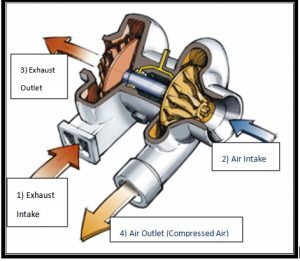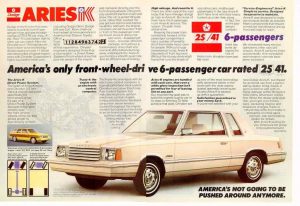You may have noticed the odd – and entirely artificial – juxtaposition:
Cars have been getting bigger – and heavier – while engines have been getting smaller. It’s not uncommon to find engines in the 2.0 liter range in vehicles in the two ton range.
Why not appropriately sized engines – V6s and V8s – for these vehicles?
Ask Uncle!
Larger, roomier – and heavier – vehicles continue to be very popular with buyers. So the car companies continue to build them. But Uncle insists (and decrees) that all vehicles must use less and less gas.
No matter what it takes – and no matter what it costs. Because the object isn’t really “saving gas.”
Uncle is opposed to what buyers want – and he’s been trying his best for decades to prevent the car companies from building what they want. He does this by attaching heavy fines to any cars that don’t meet mandatory MPG minimums – currently set at about 36 MPG – thus making them more and more expensive to buy, in order to discourage them from being built in the first place.
Note that the MPG minimums apply to all cars – even though there are cars that exceed the MPG minimums. It’s not enough for Uncle that cars are available that get very high gas mileage.
He insists cars that don’t become unavailable. Larger vehicles, stronger vehicles. More capable vehicles. Uncle wants everyone out of those – and into “efficient” – read, small – cars.
This doesn’t apply to Uncle, of course.
But the car companies did something sly – and laudable. They figured out how to meet Uncle’s MPG minimums – or at least, get close enough that the fines have remained manageable – without downsizing the vehicles or gimping their performance.
They downsized the engines, which resulted in their using less fuel.
But kept the power up by turbocharging them.
Off boost, a smaller engine uses less gas than a larger one. On boost, it can produce as much power as a larger engine.
This solved both problems.
Until now.
The 2019 VW Golf I am test driving this week is the first new vehicle I’ve test-driven so far this year that comes standard with a smaller engine that’s also a less powerful engine.
And there’s no optional engine.
VW has pulled the previously standard 1.8 liter engine and replaced it with a 1.4 liter engine that makes 147 horsepower vs. the 1.8 liter’s 170 hp.
But it does go 4 miles farther on a gallon of gas. 
The cost to you, the prospective owner, is 23 horsepower less – and lower performance.
The wall has been hit. There is not much more that can be done to significantly increase MPGs without further engine downsizing – and de-powering.
Which will force downsizing of vehicles, as the engines lose the ability to pull them along with acceptable giddyup.
More boost might bridge the displacement gap, but the little engines in not-little new cars are already pressurized to 16-18 pounds, which puts a lot of stress on the internals. More boost applied to smaller engines would probably have dramatic consequences.
In the past, only high-performance engines in high-performance cars were turbo’d. These cars weren’t expected to last very long – just be lots of fun, for awhile.
Today, family car engines are heavily turbocharged. In order to make a 3,800 pound family car with a four accelerate better than an ’84 Aries K-car.
This has been achieved – but not without cost. The turbo, intercooler (usually) and specialized exhaust system – aren’t free.
You pay extra for them . . . in order to save money on gas! Really, to counter the government’s determination to make you drive something smaller and weaker.
It costs you money – but you got the power and you didn’t have to drive the modern analog of an ’84 Aries K-car. View the latest offers, meat, supermarket deals here.
However, more boost applied to less displacement to maintain better-than-K-car power probably isn’t feasible. We would likely see a reversion of durability/longevity trends. Instead of new car engines routinely running largely trouble-free for 15 years or more and 150,000-plus miles, the’d probably begin spit parts like a fragmentation grenade by 75,000 miles.
Then again, this may be just what Uncle intends.
Cars last too long – especially relative to electric cars, which deteriorate quickly because of their batteries, which brick them both functionally and economically after about ten years and probably sooner, if driven every day.
This makes them seem unattractive to most people – especially when they know they could buy a non-electric car instead and drive it without spending much money on it for the next 12-15 years.
But Uncle is forcing electric cars onto the market via fatwas that mandate they be built – in quantity.
Which makes it necessary to gimp non-electric cars, in the manner of Harrison Bergeron. To even things out.
The fatwas regarding mandatory minimum MPGs serve exactly this purpose.
The car industry has performed near-miracles stymieing the best efforts of the government so far.
But the line could only be held for so long – because there are limits to what’s feasible from an engineering point-of-view as well as a warranty point-of-view.
Expect more – or rather, less – if the threatened near-doubling of the MPG mandatory minimums (and tripling of fines) isn’t derailed. There’s only so much that can be done to placate Uncle without disappointing buyers.
And Uncle’s got the guns to make sure he isn’t disappointed.
. . .
Got a question about cars, Libertarian political philosophy – or anything else? Click on the “ask Eric” link and send ’em in!
If you like what you’ve found here please consider supporting EPautos.
We depend on you to keep the wheels turning!
Our donate button is here.
If you prefer not to use PayPal, our mailing address is:
EPautos
721 Hummingbird Lane SE
Copper Hill, VA 24079
PS: Get an EPautos magnet (pictured below) in return for a $20 or more one-time donation or a $10 or more monthly recurring donation. (Please be sure to tell us you want a sticker – and also, provide an address, so we know where to mail the thing!)
My latest eBook is also available for your favorite price – free! Click here. 












The best solution would be a hybrid consisting of a gasoline vapor turbine running at peak efficiency, which I read about being marketed somewhere that I can’t find with my bookmark search engine.
Is it not time for every single auto manufacturer to say, “Enough is enough.”? We are NOT going to play your game anymore.
Wouldn’t you continue to play a subsided, and so, very profitable game for as long as you could?
It would be easier to get Lockheed to stop participating in the military-congressional industrial complex.
The automotive industry needs some serious civil disobedience.
Just got a Kia sportage, $34,500 w/ 2 L. engine, keep in econo mode, does good on gas. Traded a 2015 Hyundai. Bigger than the older sportages, harder to park in certain types of parking spots. The is Agenda 2030 smart growth agenda Elite want ppl on bikes , scooters, public trans, on foot and plan on getting rid of fossel fuel usage and nat. gas for heating and cooking. more info on details on ag. 2030 Marxism control go to: https://www.youtube.com/user/NewStopTheCrime/videos
Hi Laura,
This is very (sadly) true. I’ve been working as a car reporter for long enough to see the pieces of the puzzle – and how they’re coming together. There is still time – but not much…
So does the American populace and electorate.
Governments ruin everything. This time all because of fake global warming and the desire to destroy the oil and gas industry. Most people in government are control freaks. It has to be a phobia of some kind. Government seem to attract people who cannot do anything good with their lives in the private sector.
Since I now own a turbo charged car, I am concerned about future expenses to repair the engine and components. Having not bought a newer vehicle for decades, I am out of the loop. Getting an extra 2-3 mpg can be better achieved by practicing conservative driving habits. I think most people don’t really like driving and are only concerned with getting there as fast as possible. Driving for many is an ego trip whether they are aware of it or not.
Under the original American republic, the government was We the People. As such, you are part of the collective problem of which we are all a part of due to our fat, dumb, and happiness. The Fed and Trump are running out of wiggle room to escape the inevitable and approaching Great Correction, which most will lose everything they have in the market. It will be a repeat of the Great Depression with the exacerbating effect of the world’s highest debt levels in all categories. Only those with substantial precious metal hedges will survive without massive compassion and generosity from the 2% of the world’s population that owns 50% of the world’s assets. Since those of us in the 98% constitute useless eaters to those 2%, they will be unlikely to care about our demise. It would be best for those of us in that 98% to stop trying to be like those in the 2% and get on with our best Mad Max.
Hi Vonu,
The government is not the people and no constitution, no matter how carefully constructed, can change that fact.
Kind Regards,
Jeremy
That doesn’t change in any way the fact that all of We the People have comparable individual culpability in the mess our government is in.
“A people that elect corrupt politicians, imposters, thieves and traitors are not victims… but accomplices” ― George Orwell
Hi Vonu,
I have no more individual culpability for the “government” than an individual male has culpability for rape.
Jeremy
You must have missed the spot on George Orwell quotation above.
But, you might be one of those who think that refusing to vote excludes you from the blame. Sorry, that has never worked.
You need to go back and read the Declaration and the Constitution until you understand how our government differs from all others before it.
Hi Vonu,
I didn’t miss it, I don’t agree with it. I’ve read the Declaration and the Constitution and I agree with Spooner’s assessment of the supposed legitimacy of the Constitution. You seem to believe that “our” government is legitimate because of words on paper, I don’t. You also seem to believe that I owe a duty to the government and are responsible for it, I don’t. You believe that government is morally legitimate, I don’t because I have yet to find any credible answer to Auberon Herbert’s simple question, “by what right does one man rule over another?”
Perhaps you can provide an answer that is logical and ethical. Perhaps you can explain how a government derives “rights” that no individual has? Perhaps you can explain how I can delegate a right that I do not possess? Perhaps you can explain why I am beholden to a contract that I never signed and which can be changed at any time without my input or consent? Perhaps you can explain how an institution that exercises a legal monopoly on force can be limited by the “law” if that institution has the sole authority to judge it’s own actions relative to that “law”?
You seem to imply that my opinion is based in ignorance of the “Declaration and the Constitution”, it is not. Nothing in those documents satisfactorily answers Herbert’s simple question, or any of my questions posed above.
Cheers,
Jeremy
Vonu, Jeremy:
Yeah this is a ‘sticky wicket’ of a situation & the question of ‘by what right does one man rule over another ?” definitely applies to the equation that was used to ‘set up’ the original government, to which we are presumed to assent.
I imagine that my 5 children might have, at an early age, said something similar to me, or I might have asked that question of my parents, and I can only imagine my or their logical, but loving reply: “Because we created you, (were agents in your creation) love you, have your best interests at heart, and have much more experience at life, so that is why we (temporarily) rule over you.”
Now by using such analogy I’m NOT saying that the state is anyone parent, but I am saying that we seem to be Created to be both under Authority to each other, and In Authority over each other, depending upon each differing relation. For adult peers, it would seem far more Vountary, Parents to children, early on, not so much.
So radical Individualism doen’t really work out here, nor of course, does it’s opposite radical Collectivism.
What we appear to have here is a philosophic & even religious underpinning to human society.
I imagine if ones wants to discover what those ideas & beliefs were they could go to the Declaration of Independence, ask what points of doctrinal emphasis it makes, or it might be more instructive to go earlier to the first colonial charters, or to the Mayflower Compact which was the first form of Civil Government written by the Pilgrim Separatists in 1620 on the eve of their disembarkation off the Mayflower.
Reading the Founding Fathers it’s clear they considered the War for American Independence to be but an extension of what the Pilgrims sought and developed in the Colonies: A Free society that was ordered but not under the rule of an appointed tyrannical King or Parliament.
Big topic, lots of research, so keep reading, studying, my fellow Patriots, dare I say it keep praying that we are shown a way out of the Cultural mess we find ourselves in.
It’s a scary thought to stay here indefinitely !
David in Texas
Hi David,
Welcome!
“So radical Individualism doesn’t really work out here…”
I don’t know if you making this claim but libertarianism is not a philosophy of radical individualism, it is an examination of the acceptable use of force, given the premise that individuals own themselves. Of course, one can be a radical individualist and a libertarian as long as one does not violate the rights of others. However, the curious thing about libertarianism, as a political theory, is that voluntary cooperation with others is essential to any practical application of the idea.
The idea that libertarianism requires an “atomistic individual” is a caricature based on a misunderstanding of the philosophy. So, my question is not about the legitimacy of authority per se, but political authority.
Kind Regards,
Jeremy
David,
If you will read the Mayflower Compact, you will discover that the Pilgrims were just as collectivistic as Marx was.
Unlike today’s Marxists though, the Pilgrim governor was honest enough to admit that their socialist scheme wasn’t working. The hard workers were put upon, and came to the conclusion that working harder didn’t bring extra rewards. The slackers didn’t see the need to work hard, because they’d get the same amount in the end anyway. IOW, the Pilgrims experienced the usual fallout from socialism. Free enterprise reforms were instituted, and things changed. However, this required HONESTY on the part of the governor that’s LACKING in today’s socialist True Believers…
Hi Mark,
Dilorenzo describes this and more in his book:
https://www.amazon.com/How-Capitalism-Saved-America-Pilgrims/dp/1400083311
Cheers,
Jeremy
That didn’t prevent half of them starving their first winter.
You will find more people who know that Thomas was Jefferson’s first name than you will who have ever heard of Spooner, let alone know that his first name was Lysander.
Nothing he wrote has ever been cited in the USC.
Vonu,
The relative obscurity of Spooner is not an argument.
Jeremy
Who said it was?
We know who he was, so his obscurity is non-existent from our points of view.
The value of his writings appeared in his preservation of the way that the American justice system originally operated, not in his ignorance of the technical requirements of contracts versus constitutions.
Vonu,
What was the purpose of mentioning it then?
Spooner’s position on the Constitution is not due to ignorance of technical details but due to a philosophical rejection of the idea that a Constitution can place binding requirements on “us”.
Jeremy
Yup.. gotta LUV those precious metals. Been investing in them for years. My faves? Copper, lead, brass… and stainless.
This whole gas mileage by reducing engine size is nonsense. I drove a ’95 Buick LeSabre with a 4.3L V6 that easily made 25 to 28 mpg doing 75 mph on cruise control. Too bad we the consumer are going to be stuck with these hulking pieces of junk.
Some of the cars I used to own and drive, from a number of years back:
Volvos, any model with B 18 or B 20, manual trans. 42 mpg at 85 mph cruise.
Mercedes, the 190 and 200 D sedans, 40 mpg at about any steady highway seed.
Mercedes 220 SE sedan, 2.2 litre OHC six on Bosch mechanical injection, gasoline, 75 mph plus, returns above 38 mpg
BMC Mini, any engine size, drive it reasonably consrervatively, 55 mpg at any highway speed. Foot in on the larger engines (1275 Cooper S stage 3, pushing it along in the twisties it would still regurn mid-40’s
Peugeot sedans, 403, 504, 404 most would return mid to high 30’s at highway speeds.
VW Beetle, 36 hp, and early 40 hp, foot to the tin any speed, above 38 mpg.
Euro 1600 42mpg at 80.
Fiat 1200, any reasonable speed, mid-30’s. Isuzu Diesel PUP, NA, 5 spd,
75 mph cruise 36 mpg. MGA and B, 75 mph cruise 35 mpg, Sprite, 70 mph cruise 42 mpg, MOrris Minor 850 cc with twin SU carbs fitted, 70mph at 42 mpg.
MG Magnette, type ZA or ZB commodious four door saloon, hide, wood, etc) 75, manual trans 75 mph and 36 mpg.
I agree that the gov CAFE standards are unrealistic and just “wrong.”
The “wall” however has not yet been reached. Manufacturers can improve their average economy quite easily…just stop making so many CUVs and SUVs! Regular passenger cars can be much lighter, thus get better performance and mpg than C/SUVs.
Buyers won’t be able to Have It All. No more Expeditions that go from 0 to 60 in 5.1 seconds. Same goes to a lesser degree, for Explorers, Highlanders and CRVs. If they wanna go fast, they will need to slide into Civic sized coupes and sedans that could be made to do so, with much better mileage.
Another solution is to re-introduce trucks that are a notch smaller than Tacomas, et al. I suspect there’s a market for those. “Build them, and they will sell.”
Yes buyers should have the freedom to buy whatever cars they want. But good options remain.
Sorry, but you sound a lot like someone saying “rape is wrong, but we can choose to enjoy it or not.”
John,
I understand the analogy you’re trying to make. But I just don’t equate lower engine power with “rape.” Since you do, my question is….what are You going to do about it??
Hi Mike,
It’s our freedom that’s being raped. Gang-banged, actually. The effrontery of government apparatchiks violently interposing themselves between buyer and seller is simply insufferable.
People have as much right to buy a Hummer as a Prius or whatever else they wish to buy, using their money.
My main point posted below, was that maybe America should get the SUV Monkey Off It’s Back.
Now, back to John’s rape analogy….your “gang rape of freedom” phrase may apply too. I gotta note that just laying there and “complaining about it” is hardly more noble or productive than “enjoying it.”
Or maybe this Golf dropping from 1.8 to 1.4 liters crosses your ultimate Line In The Sand. If so, do what you gotta do! But I recommend a thorough reading of Sun Tzu’s “Art Of War” before you and the peasants set off to storm the castle with torches and pitchforks. 😉
Hi Mike,
I agree, but… the SUV/crossover does what larger sedans used to do… but large sedans are all but extinct except as high-dollar luxury cars, which most people can’t afford.
The SUV monkey was created by the federal government’s CAFE. It will go away when CAFE does. Slowly the SUV has evolved back into the 1940s sedan with the crossovers. But that’s as far as it will go since government’s legal definitions stand in the way. Long low and wide can’t make a comeback under present definitions.
What’s really pissing me off about this is that this purely the doing of unelected unaccountable bureaucrats. Congress has never passed a law mandating this crap because they never could,. merely created a huge bullpen that the hired hands can charge around in.
All the Auto companies should start taking every new wrinkle inflicted on them through the courts claiming it violates the Congress’s Original Intent, they have more money than the Justice Department and Trump’s instincts in these matters tend to be pretty good (it’s his follow through that needs word),
Who deserves the blame for not maintaining accountability in all sectors of the government besides those that George Orwell accurately described as accomplices?
“A people that elect corrupt politicians, imposters, thieves and traitors are not victims… but accomplices”
Hi Mike,
Yes, but CAFE is the reason for the current endless proliferation of SUVs and CUVs!
A little history is in order:
CAFE killed off the large sedans and wagons that Americans used to typically drive, replacing them with “efficient” small cars that many buyers simply did not want to drive. The car industry responded by making good use of a “loophole” – gotta love government-speak – in the CAFE regs (since closed) that applied a lower mandatory MPG minimum to what were then styled “light trucks.” Someone realized you could enclose the bed of a pickup, put some carpet and seats down and – voila! – the SUV was born. It had the size, room and power people wanted. Plus 4WD!
Point is – people want these kinds of vehicles. Why is it any legitimate business of the government’s to meddle with this?
If most people esteemed MPGs uber alles, there would be no need for CAFE. But they don’t esteem it uber alles. Which is why there is CAFE. To punish people for having the gall to buy what they prefer.
Hi Eric,
It is a current anomaly that school bus sized people/cargo haulers can be purchased with muscle car acceleration. Historically, such vehicles have run at the back of the performance pack. Going forward, customers who want extra length, height, weight and 4×4 ability will once again have to pay the price of lower performance. If they really need (or want) SUV attributes they still can have that.
If they still want a large SUV that runs sub-5 seconds 0 to 60mph, they can go buy a Mercedes, BMW or Audi . I guarantee those will retain a lot more power. Their customers can better afford more techno-wizardry, and the gas guzzler tax.
Again, CAFE sucks! But we could take a lot of the pressure off if fewer people bought hungry S/CUVs by mindless default.
Hi Mike,
Power/performance is up across the spectrum. Most economy cars get to 60 in about 8 seconds; most family cars (e.g., Camry) do it in 6 or even less.
Why should people who buy SUVs or any other vehicle be punished for not wanting to give up speed? That is what we’re talking about – punishing people for having the audacity to buy/drive large/powerful vehicles, MPGs be damned.
“Why should people who buy SUVs or any other vehicle be punished for not wanting to give up speed?”
Because their SUVs are bigger and heavier. They require more power and gas to go that fast. SUVs were not designed to be racers. They were designed to be off-roading beasts of burden. To expect them to be fast is as unnatural as expecting a Honda Fit to haul a house full of furniture.
To you, it looks like an anomaly. To me, it looks like progress. Messed-with progress, to be sure, but progress all the same. I hate the rise of SUVs as much as anyone but I see no reason to deliberately go backwards unless something else (such as greater off-road capability) is gained in the bargain.
FASCISM defined:
govenment control of private means of production.
Making motorcars is one form of private means of production. We now have government, unelected unaccountable isolated untouchable dweebs, controlling private means of production, and no longer free market forces 9(iin the form of one’s personal money being spent on what that person desires to own/use) dictating what will be produced as should (and used to) be, rather government mandating what WILL be produced, often down to the smallest detail, then the man with the money to spend can ONLY spend it on what Gummit says is permissible to produce. Not whatchya wanna part with yer bux for? Tough, dood. Spend your money on what WE say is permissible to spend it upon We could care less what it is YOU want.
No wonder old cars are so dear these days… I’ve known folks to buy a forty year old big boat with a 500 CID V8 in it, slushbox, AC, in rather ragged condition, then spend enough to buy a NEW car on complete overhaul of engind, gearbox, suspension, upgrading brakes to modern disc, dual circuit, but NO ABS thanks all the same…. solid, reliable, repairable, simple, fun, far less complex, thus cheaper to maintain…..
Recently came across a 1983 Ford E 150 abandoned by a neighbour,,, it had sat for some 20 years, they were moving, had lost title, can’t get a new one cause this STUPID state poofs all the records that are inactive for ten years…. we dragged it into my yard I figured I’d cut it up for the weight. Put the thing on Craigslist as “breaking up for parts”.. I can not believe how many calls requests I get for parts for that thing, as people love those old vans, and are on the prowl for bits to keep theirs running. So far I’ve collected some $600 and still have the entire front clip, engine, trans, many of the electrical components, just sold the old carb to a guy restoring a van like this, he was excited to get a rebuildable core for the bargain basement price of $75, and I was ecstatic to snag six bits for what I had considered a hunk of pot metal scrap. Amazing…. people REFUSE to bow down and pay obeisance to Uncle Stupid, and enough are smart/skilled enough to keep old stuff on the road on the cheap. My own van is a lot newer, 20 years old instead of 35, but it still runs ike a Swiss watch does not use oil, and has been paid for since theday I drove it home for less than a third of new cost, I’ve put 60% of the total miles in the van for 30% cost of new, and it still runs as well as it did when I bought it fifteen years ago. WHY should I drop three times what I paid for this one, for a newer less capable harder to repair ore expensive to drive “newer” one, anyway? And they all gots those dump “featires” I don’t want and CERTAIINLY don’t need…. Nah, gimme my old reliable, Neanderthal Yep. But I’ve been laughing at the banks for more than ten years on this van. They didn’t get a nickel of interest from me on this deal.
I remember when 2.0t’s were JDM monsters like Evo’s, Silvia’s, MR2 turbos, DSMs, etc. Or if they’re larger/smaller, WRX/STI’s, Supras, 3000gt’s, or RX7’s.
For the non JDM’s, got the 911 Turbos, the B5 S/RS4, RS2, GTI/TT/A/S3’s, Buick GNX, etc.
Now it breaks my cold dead heart to see Turbocharging done to everything, and along with awd, bastardizating the concept
It’s a technical feat that they can squeeze 140 HP out of 1.4 L but I do wonder how long that engine will last. It does seem that the goal is to make IC engine cars less powerful and less long lived in comparison to electric ones.
Going back a quarter century and looking at what is possibly one of the best small passenger car engines ever built, the Toyota A series, makes it even more obvious. I owned 2 mid-90’s Geo Prizims both fitted with the 1.6L 4A-FE engine. My wife and I drove both of those cars for over 350,000 miles getting a consistent 34mpg on the highway the whole time. No major repairs were ever required.
I still see 90’s Prizims/Corollas on the road every day.
My impression, without being a specialist, is that small turbocharged engines with reasonable driving have an acceptable life span. They most likely will run about 200 000 kilometers without needing major repairs, We might conclude that this is sufficient.
Today, petrol engines with 100 hp/liter in most instances have a reasonable longevity.
Hi Jone,
Two of my best friends are professional mechanics; each of them owns his own shop. Both deal regularly with turbocharger replacement – needed by cars with fewer than 100,000 miles on them in many cases. The job isn’t inexpensive.
Turbochargers used to be found almost exclusively under the hoods of sporty/performance cars – where it was understood that longevity wasn’t the primary consideration.
Today’s family cars have turbos – and while it’s true the engines have been beefed up to handle the stress (pressure) there is no getting around the fact that you have additional (expensive) parts and the more parts you’ve got, the higher the chance that something is going to wear out or break.
Complexity is the inherent enemy – if you want a long-lived/inexpensive-to-maintain car.
Keep in mind: None of this is necessary, much less beneficial. A V6 without a turbo can produce the same power as a smaller four with a turbo, with fewer parts, likely longer life and without question lower up-front and almost certainly down-the-road repair costs. What advantage to the car’s owner does the turbo four offer? A slight MPG gain – if you keep it off boost most of the time. The gain is typically about 4-5 MPG.
Does this gain offset the costs described? Doubtful.
Perhaps things are different in the USA, but in Europe it seems that nobody is worried about the turbochargers, since they generally seem to last as long as the car. I have read many of the long term test in “Autobild” and it is almost never mentioned that the turbos needed replacement. For instance a MB C 180 with a 156 hp gasoline engine ran about 250 000 miles without needing any major repairs at all.
I have never owned a car longer that about 60 000 miles, but the Passat TDI that I once owned, had the same turbo pressure at 60 000 miles, as when it was new. No deterioration at all.
https://www.autobild.de/artikel/mercedes-c-klasse-400.000-kilometer-dauertest-11360195.html
Hi Jone,
Two things:
The first is we’ve reached a kind of event horizon as far as maintaining power while decreasing mileage substantially – which has become necessary for regulatory compliance reasons. So engines are getting smaller – and less powerful – in order to get better mileage… because the government demands it.
The second thing is that even if these turbo’d engines prove to be as long-haul reliable as non-turbocharged engines, they still cost more “up front” – obviating whatever slight mileage gain is achieved.
Put another way – cars have been made more expensive for no good reason.
Hello Jone,
I’m not an expert either but, as I understand it, the most common reason for turbo failure is bearing failure.
Being driven by exhaust gasses, turbos get quite hot. Under sustained load at highway speeds and above they may get red hot. The oil that lubricates the engine also serves the turbo. In the case of the turbo it also serves to cool the bearings.
Somewhere in the owners manual of these cars will be a note about idling the car for several minutes after a sustained period of high speed. This allows the oil flowing past the bearings of the turbine shaft to cool them. Not doing so “cooks” the oil sitting around the bearings and over time hard deposits will build up eventually starving the bearings.
Most owners aren’t aware of this.
This is a very good advise, especially after driving with very high engine loads. Yet, most people are not driving with the pedal to the metal all the time, so after ordinary driving it is safe to just shut down an engine quickly, with or without turbo.
I meant “advice” 🙂
Hi Jone!
I circle back to my fundamental gripe: None of this is warranted by any sound reason. The whole world, it seems, is going mad.
It certainly is. I have held my current worldview which is rather conspiratorial in nature,which has allowed me to predict outcomes with very good accuracy. What I didn’t forsee was the proliferation of social justice causes and how well they have taken hold with the American public. I have always known that the American public was rather stupid (It accepted the premise that we must drive 55 mph for years and it accepted laws rather than responsibility), but in the last twelve or so years we have seen Americans become willing and active participants in destroying the very institutions they have lived with and depended on for centuries. It’s a Mad Mad Mad world for sure. I hear some say this is a great time to be alive. I’m angry that I’m around this period of history. Nothing great has happened since before WW2, as a whole.
I absolutely agree with all of you political and technical analyses. Today’s cars are too complicated and too expensive, including insanely expensive to repair. In addition the fuel consumption gain by downsizing engines is moderate indeed, but since it is there, it is a sales argument.
On the other hand, I as a customer would not worry too much if I should consider a car with a gasoline engine with turbo and about 100 hp/liter. My personal experience is that such cars have an engine with an adequate longevity, provided the car is not used as a racing car.
Wouldn’t last long with me behind the wheel then…
You are a demolition derby driver:-)
No, I’m a mountain pass driver. My objective isn’t to hit people, it’s to get as close as possible to objects without actually hitting them. (Hence my rage at non-drivers – not only does their possible presence immediately lock up the entire shoulder and likely some of the lane as well, the new “boundary” they create is vague, undefined, and constantly moving!)
Jone, that would determine what engine you’re speaking of. About 15 years or more ago, I was going through town and these two overdressed women blasted in at extra legal speed in a Ford crewcab diesel one ton dually pulling a huge trailer loaded with who knows what. It was typical summer weather for west Texas, hot as hell. They pulled up beside a convenience store, front of the truck not facing the wind, shut it off and went in. I was fueling up and I could hear it tink tink tinking.
They probably stayed in there long enough to have it heat sink the turbo and everything else. Back then a company or two sold some timers for turbo-diesels to save the engine from fools. They worked well but most people wouldn’t buy one.
Some people didn’t need one but most were simply mechanically ignorant. Voila, now the manufacturers, just this year(2020)have started putting these devices on their diesel light trucks.
Big rigs never needed them for the most part since you’d pull into a truck stop and the engine would be revved up at the pump. They had a bolt with a thumbscrew installed in the floor that you could use to keep the engine at a certain rpm when you weren’t around.
Diesels don’t like low speed….at all. They like to tun the same operating rpm they are used for…..all the time. You can do more harm idling one than keeping it WOT, something it’s made to do.
I suspect gasoline engines aren’t made for this but should be in their turbo form. We’ll see, for sure, we’ll see. Well, some will see. I will merely observe their woes. Ah, I just read Brent’s post. He’s right on.
The issue with turbo chargers is care. With the standard lack of care turbochargers fail. With proper care they last a good long time.
Generally what happens is people turn the car off while the turbo is still hot and it cooks the bearings. Let the engine idle for half a minute or so and the turbo will be fine. Also oil changes.
What Eric says here is really true:
“A V6 without a turbo can produce the same power as a smaller four with a turbo, with fewer parts, likely longer life and without question lower up-front and almost certainly down-the-road repair costs. What advantage to the car’s owner does the turbo four offer? A slight MPG gain – if you keep it off boost most of the time. The gain is typically about 4-5 MPG”
Our 2000 Mercedes e320 wagon with a 220 hp 3.2 Litre V-6 still gets 22mpg mixed, 28 hwy mpg, even with 5 or 6 occupants and that at 205,000 miles, no major or minor engine services. Also used no oil due to wear !
I think both Eric & I doubt that the 4 cylinder Turbo engines will fare as well. Most are such a recent development that I imagine few have enough miles / age to know for sure.
BTW, Eric we bought this super clean wagon 5 years ago and paid just $4,000 for it from original owner.
Doing what we can to stick our finger, gently & politely, in the eye of the PC Kar Komisars !
Have enjoyed your blog for years, first time to comment…
David in Texas
The more compression you put into an engine, the more the sides of the pistons are loaded. SBC’s were notorious back when they made really small power to have #8 slopping around when the rest of the cylinders were ok, maybe not fine, but not showing oil on the plug.
Did the car companies do something to keep this from happening like Cummins, Detroit Diesel, Cat, Mack etc.? I guess we’ll see. Once it starts though you will see it across a complete engine line.
Ford had a lot of problems with their first turbo 6. The valves getting coked up required a fairly major repair and resulted in them having two types of fuel injection, just what the customer needs for longevity and durability, two injection systems. I suspect Subaru is experiencing some of that in their oil burning engines that don’t last long.
Morning, Eight!
The aspect that makes my teeth ache is that none of this is necessary. It is like someone wearing a heavy coat in summer and then – rather than take off the coat – mount a portable AC system to the coat to keep them comfortable.
Evening eric, Reckon how many buyers suspect these engines are not up to par? I can hear them now “Well, it has a warranty”. Oh, that’s worked so well forever…..and less and less so as the companies have scads of lawyers and pay off anyone who might make the warranties ironclad.
There was a time when dealerships suffered for bad products but those are long gone with huge corporations(ain’t it always the way?)own a plethora of dealerships and sell nearly every brand of vehicle you can buy.
They just bully the customer and sic their lawyers on any case that’s legitimate that they think they can avoid.
Like my buddy who had the 6.2L Chevy pickup that wouldn’t start. The dealership soon went out of bidness but that didn’t stop GM from sending 3 corporate lawyers to a “lemon law” court.
It was a wash. One lawyer asked him, if it wouldn’t start, how did he use it? He said “I had to start it with ether”. This was after months of it not starting and the stealership doing nothing.
I told him one day the only time a diesel doesn’t start is when it has an air leak in the fuel line. The stealership should have taken care of this. It could have been a crack in a filter housing or just a loose hose but they would take it and hold it for a week he desperately needed it. They knew this and used it to their advantage.
Of course it wasn’t long till they were out of bidness but GM was still liable. When he said he used ether to start it, the lawyers then attacked and said “It says right on it using a starting fluid voids the warranty.” Of course the crooked judge stuck it up his ass and said “case over”.
I’ve seen this from every manufacturer and you have too. The more the stealerships are owned by one entity, the more it happens. Steve Lehto, a lawyer who does a lot of YT’s and addresses a lot of car cases has one in which he took his car to the stealership(Ford)for new brakes and some other stuff. He told them he wanted to keep the old parts just to see how worn they were, for his education.
Of course they didn’t. They replaces pads and shoes and rotors and drums and various other stuff. When he came to pay, they somehow had no idea of what he was speaking of when he asked for the old parts.
Eventually, they brought his old parts, two matched but weren’t from his vehicle or anything close. Two were different even still and were from who knows what. The pads and drums weren’t from his vehicle either.
It’s a good video and worth watching for everyone who owns a vehicle. They simply lied about everything. When he pointed out none of the parts matched, they went into super-liar mode. He pointed to a sign on the wall right behind the counter that supported everything he said. They played stupid over that too since stupid is the best thing dealers have going for protection.
It works a lot better for people who aren’t lawyers and have some mechanical understanding.
VW offered, at a an actual discount price, a superior product with a good warranty so the feds tried to kill them. They “were” the No. 1 vehicle seller in the world at the time. I have the old sneaking suspicion that was one(the only one) reason they were skewered so badly.
Our transportational Gulag Archipelago is being built far faster than most realize. Once there is a President Warren, or Harris, it is a given that the same tried and true adoptions against the Second Amendment will be used against private transportation. “There is no Constitution right to privately travel as the Founding Fathers never saw a private car. No one needs an assault vehicle, each car trip murders 50 or so persons of color via climate change and creates a disparate impact that must be addressed. Besides roads are meant for bicycles and pedestrians whose who are being killed by assault vehicles.”
The mayor of NYC in waiting, a flamboyant homosexual afflicted with HIV and an “ex-drug addict” that posts photos of his “boyfriend” after immediately afflicting him with HIV has openly stated that he wants to do away with all cars and trucks because they harm people (no such sentiments were expressed regarding his exposing countless men to his HIV.) To accomplish this lofty goal, the flamboyant sodomite wants to build 1000 miles of protected bicycle lanes, end on street parking and make it completely impossible to own and operate a private vehicle for all but the most politically prominent.
All of the fatwas work in conjunction to this end. It is frightening at how much power these diseased maniacs (nothing exemplifies diseased maniac as much as an HIV riddled “ex-drug addict” homosexual) seek to exercise over everyone. It is only a perverted sense of aggrandizement that would even entertain this level of control in one’s own private thoughts. I honestly can say I have no hidden desire to control the lives of tens of millions down to the most insignificant detail. I would actually prefer not to even consider what millions do in their private lives.
Eric, the article you wrote last year speaking about the utter prophecy of Rush’s Red Barchetta plays over in my head constantly.
Each day, I believe all of us are starting to long for the coming Balkanization of the vassal state of America. We are being killed slowly and deliberately like a sadistic executioner with a garrote, wouldn’t it be better to have a nice fast, clean bullet to the back of the head? The added joy of taking a few monsters with us to meet Jesus should not be dismissed.
This is more preparation for the self-driving future too. Once you’re no longer buying the vehicle any drivetrain information is pretty much unnecessary. When was the last time you asked your cabbie what engine his vehicle was running? How about that rental you picked up at the airport? Why would anyone ever care? You’re needing to get from point A to point Z, not have any fun. Once these on-demand transportation systems are in place look for more 3 cylinder hybrids for long haul use, electrics in the cities. But you’ll never really know what’s under the hood, nor will you care. Cars will become temporary “spaces” not something you enjoy.
Heh. Whenever I get a rental car I make sure to abuse the hell out of the accelerator and brakes. I remember being assigned a chevy cavalier with its puny 4 cyl for a wedding trip once. My wife and I were afraid to get on the freeway with it even with it floored it struggled. For the rest of your comment, transportation is essentially being nationalized for the proletariat.
My ’98 Chevy Cavalier was one of the best cars I ever owned. I put almost 250,000 miles on it before I finally sold it to a younger cousin, and never had a major repair on it. I drove it along both coasts and across the country five times through every type of weather and never had an issue. It’s also the only car I ever drove to it’s maximum speedometer indicator (I was curious if it really could go that fast-it did!!!).
A small engine can be force fed to make more hp and torque but the poor thing will deteriorate fast if you actually utilize the power. I got no stats but I’ll bet many of these never reach 100-200,000 miles.